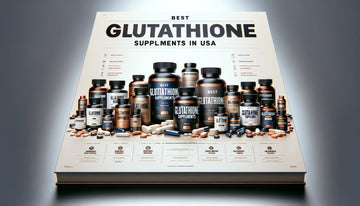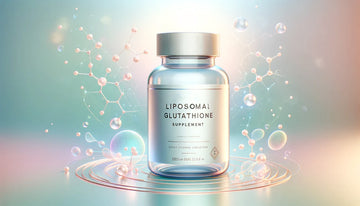

Glutathione vs Collagen: Which is Your Skin's Best Friend?
Table of Contents
When it comes to having healthy and youthful-looking skin, two buzzwords that are often thrown around are collagen and glutathione. But what exactly are they, and how do they help your skin?
In this blog post, we will dive deep into both collagen and glutathione, exploring their benefits for the skin and how they work.
Get ready to uncover all the secrets behind these two skin superstars!
What is Collagen?
Collagen, a vital protein for skin structure and elasticity, also aids in wound healing and maintaining skin tone. With age, decreased production leads to sagging skin. Oxidative stress can further impact collagen synthesis and skin elasticity.
The Role of Collagen in Skin Health
Collagen, responsible for skin elasticity and firmness, supports complexion and aesthetics of aging. A diet rich in amino acids stimulates its production, while collagen peptides improve skin health and reduce aging signs. This powerful antioxidant protects skin from reactive oxygen species, promoting overall skin health and vitality.
How Does our Body Produce Collagen?
Collagen production is regulated by transforming growth factor and gene expression, while vitamin C is essential for synthesis and skin health. Glutathione levels also influence collagen production, making glutathione supplements beneficial for boosting collagen and improving skin health. Nitric oxide, whey protein, and glutamic acid also play a role in collagen synthesis.
Recognizing the Signs of Collagen Deficiency
Collagen is a protein that is found abundantly in the human body. It is responsible for providing structure and strength to connective tissues, including skin, bones, cartilage, tendons, and ligaments. As we age, our bodies produce less collagen, which can lead to a number of visible and physical signs.
Signs of collagen deficiency
- Wrinkles and fine lines: Collagen helps to keep skin plump and elastic, so a decrease in collagen can lead to the appearance of wrinkles and fine lines.
- Skin sagging: Collagen provides support to the skin, so a loss of collagen can cause the skin to sag and lose its youthful appearance.
- Joint pain and stiffness: Collagen is found in cartilage, which cushions the joints. A decrease in collagen can lead to joint pain and stiffness.
- Weak bones: Collagen is also found in bones, and a loss of collagen can lead to weak and brittle bones.
- Slow wound healing: Collagen is important for wound healing, so a deficiency can slow down the healing process.
An Introduction to Glutathione
Glutathione, a master antioxidant crucial for skin health and immune system function, plays a vital role in detoxification, cell protection, and regulation of the immune response. Healthy levels are essential for maintaining overall skin health and tone, affecting the skin's ability to fight free radicals and oxidative stress, making it an important consideration for skin care. Glutathione supplements can support collagen production and skin health.

How Glutathione Benefits the Skin?
Aiding in skin hydration and elasticity, glutathione plays a crucial role in collagen synthesis for firm, youthful skin. Its powerful antioxidant properties protect the skin from free radicals, maintaining healthy skin tone and reducing oxidative stress for overall skin health.
The body naturally synthesizes glutathione to combat aging effects and support wound healing and the immune system. However, natural glutathione levels decline with age, influencing skin health. Diet, stress, and environmental factors can affect glutathione levels, making it vital for the body’s defense system.
Symptoms of Glutathione Deficiency (Check Here)
Glutathione vs Collagen: The Role of Supplements for Skin Health
Glutathione is a powerful antioxidant that helps protect cells from damage caused by free radicals. Free radicals are unstable molecules that can contribute to aging, inflammation, and disease. Glutathione also helps to brighten skin tone and reduce the appearance of wrinkles.
Collagen is a protein that gives skin its structure and elasticity. As we age, our bodies produce less collagen, which can lead to wrinkles and sagging skin. Collagen supplements can help to increase collagen production and improve skin texture.
Here is a table summarizing the key differences between glutathione and collagen:
Feature |
Glutathione |
Collagen |
|
Primary function |
Antioxidant |
Structural protein |
|
Benefits for skin |
Brightens skin tone, reduces wrinkles |
Improves skin texture, reduces wrinkles |
|
Dietary sources |
Fruits, vegetables, meats |
Meat, fish, poultry |
|
Supplement forms |
Capsules, powders, liquids |
Capsules, powders, liquids |
Glutathione vs Collagen: Which is Better for Skin Health?
What are the Benefits of Glutathione for Skin Health?
Glutathione has a number of potential benefits for skin health, including:
- Reduced appearance of wrinkles and fine lines
- Improved skin elasticity
- Brighter and more even skin tone
- Reduced hyperpigmentation
- Protection against sun damage
What are the Benefits of Collagen for Skin Health?
Collagen has a number of potential benefits for skin health, including:
- Increased skin elasticity
- Reduced appearance of wrinkles and fine lines
- Improved skin hydration
- Reduced skin roughness
Pros and Cons of Glutathione and Collagen Supplements
Glutathione
Pros:
- Powerful antioxidant
- May help to reduce the appearance of wrinkles and fine lines
- May help to improve skin elasticity
- May help to protect against sun damage
Cons:
- More research is needed to confirm the benefits of glutathione for skin health
- Glutathione supplements may not be well absorbed by the body
Collagen
Pros:
- May help to increase skin elasticity
- May help to reduce the appearance of wrinkles and fine lines
- May help to improve skin hydration
- May help to reduce skin roughness
- May help with wound healing
Cons:
- Some collagen supplements may contain fillers or other ingredients that are not beneficial for skin health
- Collagen supplements may not be well absorbed by the body
Which Supplement is Better for Skin Health?
The best supplement for skin health may vary depending on your individual needs and goals. If you are concerned about the appearance of wrinkles and fine lines, collagen may be a good option. If you are looking for a supplement that can protect your skin from sun damage and environmental pollution, glutathione may be a better choice.
Natural Food Sources of Collagen and Glutathione
Nutrient |
Rich Food Sources |
|
Collagen |
Chicken, fish, shellfish, bone broth, citrus fruits, legumes, peppers, leafy greens |
|
Glutathione |
Spinach, avocados, asparagus, okra, broccoli, eggs, tomatoes, nuts and seeds |
Frequently Asked Questions
Can Glutathione and Collagen Be Used Together?
The synergistic use of glutathione and collagen can enhance skin health. Combining these two ingredients supports skin repair, firmness, and cell regeneration. It also promotes healthy aging and complements each other for optimal skin benefits.
Which is better, glutathione or collagen?
Glutathione and collagen are both important for overall health. Glutathione is a powerful antioxidant that helps to protect cells from damage, while collagen provides structure and support to tissues. The best supplement for you will depend on your individual needs and goals.
How can I get more glutathione or collagen in my diet?
There are a number of foods that are rich in glutathione and collagen. Some good sources of glutathione include:
- Fruits and vegetables, such as broccoli, spinach, and avocados
- Nuts and seeds, such as walnuts and almonds
- Sulfur-rich foods, such as garlic and onions
Some good sources of collagen include:
- Meat, poultry, and fish
- Bone broth
- Eggs
- Citrus fruits
Can I take glutathione or collagen supplements?
Glutathione and collagen supplements are available over-the-counter. However, it is important to talk to your doctor before taking any supplements, as they may interact with other medications you are taking or have side effects.
Let’s Sum Up
In summary, both glutathione and collagen play essential roles in maintaining healthy skin. Collagen provides structure and elasticity to the skin, while glutathione helps protect the skin from damage caused by free radicals and oxidative stress.



















